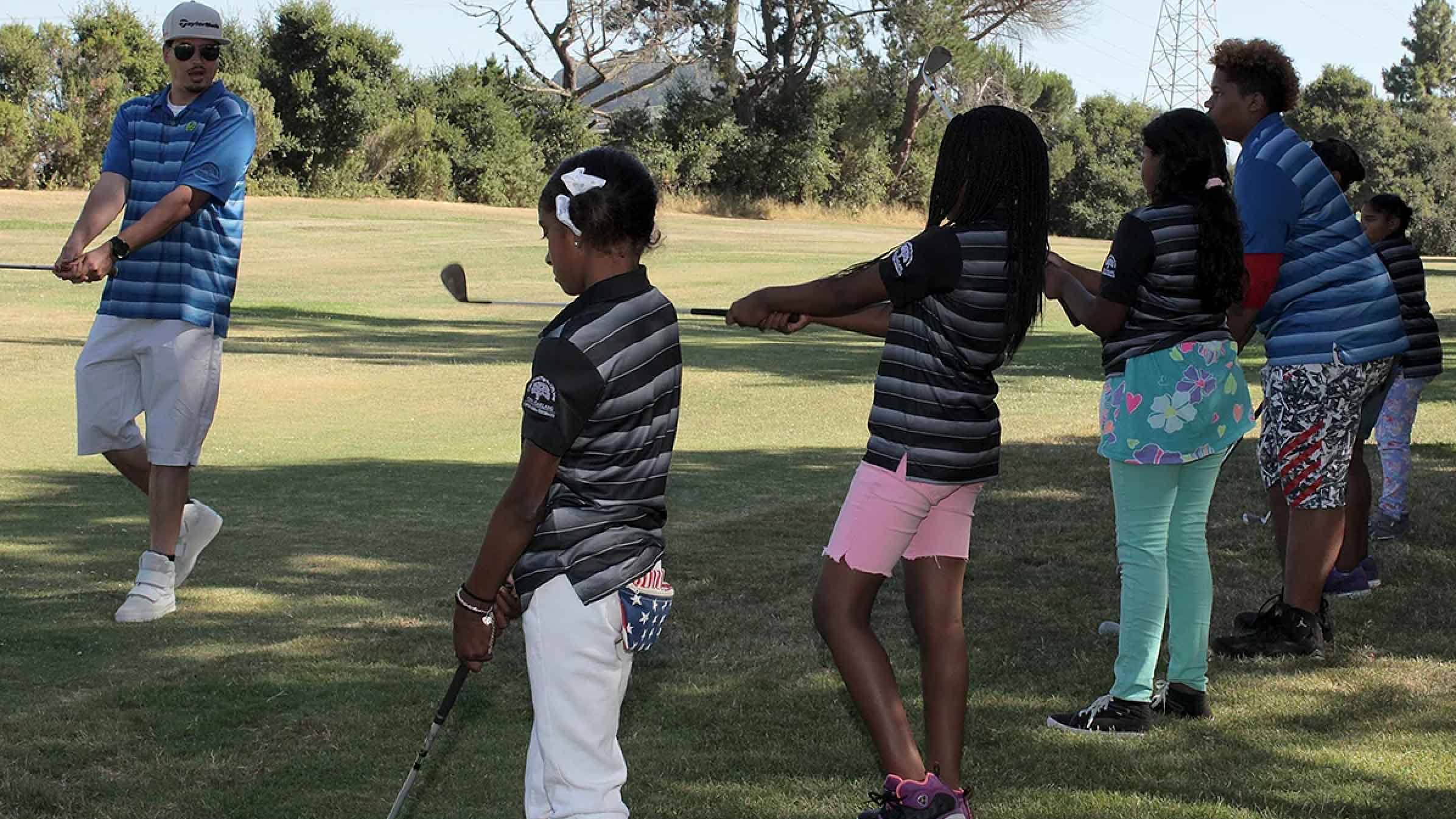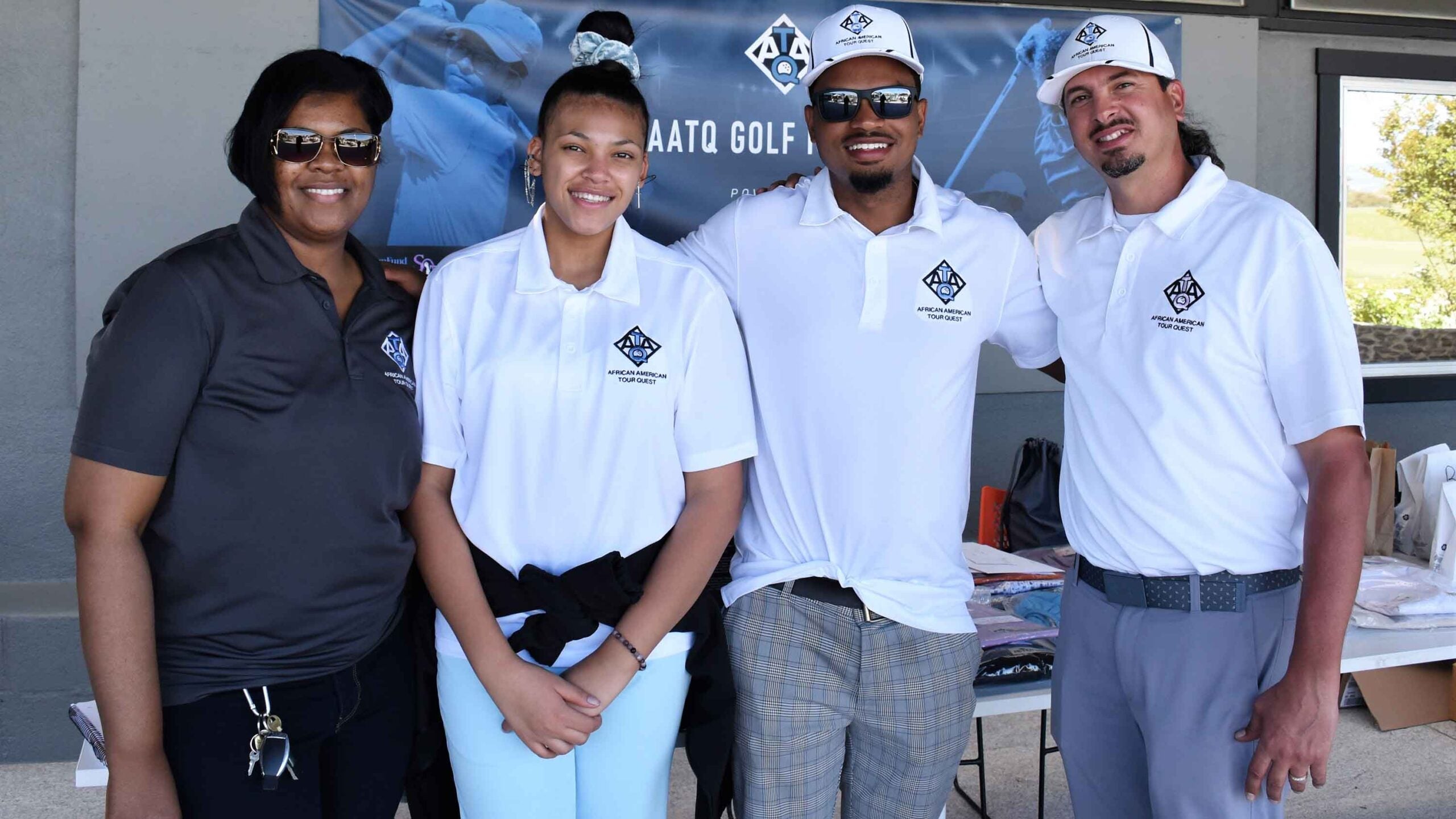
Preston Pinkney working with a group of young players in East Bay.
When Preston Pinkney says that golf can change a life, he speaks from experience.
The first life he saw the game change was his own.
It happened a little more than 20 years ago, when Pinkney was a young man at a juncture, faced with several paths that looked like probable dead ends.
In the rough-edged neighborhood where he was raised, in Richmond, Calif., just east of San Francisco, Pinkney held a world view shared by many of his peers.
“If you were going to really make it, the thinking was that you had to be a rapper or an athlete,” he says. “The other option was to start dealing dope.”
Not that Pinkney lacked for guidance and support. A former high school mentor warned him of the pitfalls before him and offered advice on how to avoid them. His mom kept on him to land a steady gig, something more consistent than the bootstrapping music studio he’d founded.
But all of that was easier said than done.
It was right around that time that a job fell into his lap. Through a longtime golfer he’d met through music, Pinkney was offered a position as a shuttle driver for the Ace Foundation, an Oakland-based nonprofit aimed at opening opportunities for kids through golf.

From far right: Preston with son Preston Jr., daughter Nia and wife JoVannie at a recent African American Tour Quest event.
From his seat at the wheel, ferrying young passengers to local public courses and practice ranges, Pinkney gained an outlook through a different lens. Everything about the game seemed new and welcome. The challenge. The greenery. The codes of conduct. Pinkney’s sense of himself began to shift as well. The kids looked up to him. Regarded as a role model, he made it a priority to act the part.
Another crystalizing moment came in 2001, when Pinkney led an Ace Foundation outing to Monterey and the AT&T Championship at Pebble Beach. Gawking at the grand houses on 17-Mile Drive, taking in the coastal vistas and the roars of the crowds tracking Tiger Woods, Pinkney saw a future he’d never envisioned.
“I thought to myself, ‘All these possibilities — this is what golf is about,’” he says. “I started imagining doing things I never would have even dreamed about before.”
As his own game improved, Pinkney rose through the Ace ranks from driver to instructor to program coordinator. Sociable by nature, he built a Rolodex and worked his contacts, growing enrollment, raising funds. Fast-forward to the present. The Ace Kids Golf Foundation, as it is called today, is a vibrant force in East Bay junior golf, with year-round offerings for youngsters ages 5 to 18. Just before the pandemic, nearly 1,000 kids took part annually in Ace programs, a number that fell slightly during lockdowns, but which has now risen close to what it was.
In everything Ace does, Pinkney is its lodestar, a guiding light.
“He’s got such dedication and such amazing people skills, he’s become a truly powerful voice within the community and for the community,” says Tony Canedo, a PGA-certified teaching professional who serves as Ace’s lead instructor. “We have all these ideas, all of these ambitions for how we can help the kids, and finding the resources to accomplish those things isn’t easy. Somehow, when we need something, Preston always seems to find a way to get things done.”
Last year, Pinkney tasked himself with doing even more. For all that Ace provided, Pinkney knew the program had built-in limits. After 18, its youngsters aged out. What about the kids who wanted to keep at it, who hoped to play competitively in college or beyond, or to make a living elsewhere in the game? Such ambitions called for talent and motivation but also money, training and other backing.
In early 2020, with his wife, JaVonnie, Pinkney founded African American Tour Quest (AATQ). As its name suggests, the organization strives to promote diversity in the game by supporting young Black golfers in their goals, whether it’s to turn pro, teach, run tournaments or assume some other post in the industry. Though AATQ has just begun to gain its footing, it already has a handful of players in its stable, providing them with access to sports psychologist, trainers, practice facilities and more.
Among those golfers is Ed Hackett, 23, who played his freshman year at Alabama State, earning Southwestern Athletic Conference co-MVP honors, and who now stars at Cal State Monterey Bay. Another is Adrian Davis, only 19 but already seasoned on the California amateur circuit. Like Hackett, he dreams of turning pro.

From left: AATQ participant Tre Craig; AATQ director of player development Jeffrey “JC” Callaway; and Tour pro Joseph Bramlett.
Davis, who came up through the Ace program, is also now an Ace instructor, teaching youngsters the etiquette and swing fundamentals that he learned in the same classes when he was their age.
The Ace program is based out of Lake Chabot Golf Course, a laidback Oakland muni where Pinkney keeps an office. In his minimal spare time, he serves on the board of the Northern California Golf Association, which recently donated a simulator to the Ace program; Pinkney intends to make the machine a centerpiece of a high-tech teaching facility he’s trying to build at Lake Chabot, as a complement to the low-tech driving range his Ace kids use today.
Meanwhile, there is always other work to do. Among his many duties, Pinkney busies himself with outreach efforts to potential students and benefactors alike. The NBA star Steph Curry has given generously to both ACE and AATQ. Recently, Robert Baker, the noted golf coach known for his work with Ernie Els, donated 1,200 junior training sets, which Pinkney plans to use in golf development programs in public schools.
Through Ace, Pinkney says, his goal in the next three to five years is to make sure that every child in Oakland gets to touch a golf club.
Make it a simple introduction. You never know what might change from there.









